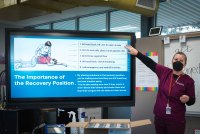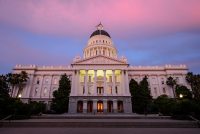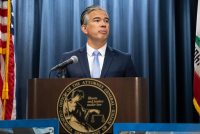Latest Morning Briefing Stories
Listen: Teaching Teens to Reverse Overdoses, Taxes on Uninsured Californians, and More
California Healthline journalists report on efforts to train teens to use the opioid overdose reversal drug naloxone, the state’s decision not to spend the tax penalty money from uninsured residents, Centene’s political contributions, and efforts to keep young kids on Medicaid for several years after birth.
California Aims to Maximize Health Insurance Subsidies for Workers During Labor Disputes
Workers who lose employer-based health coverage during a strike or lockout will have access to a full-subsidy plan through Covered California.
Rob Bonta Investigates Hospital Algorithms for Racial Bias
Attorney General Rob Bonta handily won election on a progressive, social justice platform. He’s already begun with an inquiry into hospital software programs that might bake in racial discrimination.
Fight Over Health Care Minimum Wage Yields a Split Decision in Southern California
Voters in Inglewood were poised to approve a union-backed $25 minimum wage for workers at private hospitals and facilities, while Duarte voters rejected it.
California Stockpiles Penalties From Uninsured Residents Instead of Lowering Care Costs
California is collecting hundreds of millions of dollars a year in tax penalties from uninsured residents. The state was supposed to use the money to help lower costs for Californians who couldn’t afford insurance but hasn’t distributed any of the revenue it has collected — citing uncertain economic times.
Abortion Issue Helps Limit Democrats’ Losses in Midterms
Although control of Congress was still undecided Wednesday, Republicans seemed poised to take power in the House, while the fate of the Senate remained too close to call. Economic issues were at the top of voters’ minds, but abortion access also played a large role in their decisions.
Stopping the Churn: California and Other States Want to Guarantee Medicaid for Kids
California is looking to stop the churn of children who go off and on Medicaid and is weighing new continuous-enrollment policies for youngsters up to age 5, no matter if their household income changes.
Election Canvassers Want Latinos to Know Voting Is Good for Their Health
One of the nation’s largest community clinic chains is running a get-out-the-vote campaign in Los Angeles and Orange counties this election, targeting primarily Latino communities, where turnout tends to be low.
Centene Showers Politicians With Millions as It Courts Contracts and Settles Overbilling Allegations
Centene, the largest Medicaid managed-care company in the U.S., has thrown more than $26.9 million at political campaigns across the country since 2015, especially focused on states where it is wooing Medicaid contracts and settling accusations that it overbilled taxpayers. Among its tactics: Centene is skirting contribution limits by giving to candidates through its many subsidiaries.
California’s Proposed Flavored Tobacco Ban Gives Hookah a Pass
Californians will decide Nov. 8 whether to approve a statewide ban on the sale of flavored tobacco products, including menthol cigarettes. But the measure, known as Proposition 31, exempts hookah tobacco. Anti-smoking activists criticize the carve-out, calling it the latest example of businesses using identity politics to profit from a deadly product.














